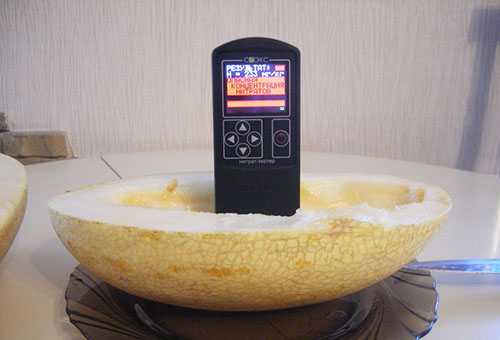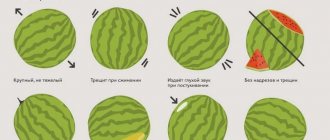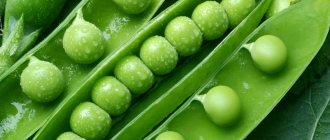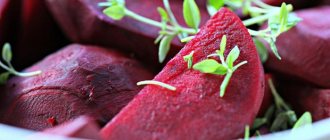Many people love watermelon - both toddlers and adults, because it is a storehouse of vitamins, fiber, and water. It cleanses the body of toxins and other harmful substances that the baby’s cells and organs have not yet accumulated. But the berry will also be useful for the baby, because it acts as a diuretic and laxative. In addition, watermelon contains potassium and magnesium, B vitamins, folic acid, manganese and other trace elements. This composition has a positive effect on vision, immunity, and the functioning of the nervous system. This aromatic berry improves your mood with just its taste.
More articles related to your question
- Applesauce for babies: how to choose and prepare your own fruit treat for your baby
- Corn porridge for a baby: when to introduce it into the diet and how to prepare it
- Buckwheat porridge for a baby of the first year of life: first complementary foods and preparation rules
- Mashed potatoes for babies: recipes and recommendations
- When should newborns take vitamin D and how should it be given?
- Homemade kefir for a baby: benefits and necessity of the product, methods of preparation and introduction into the baby’s diet
With all its advantages, watermelon also has a number of contraindications due to its rather active effect on the body. Therefore, parents of tiny children are interested in the age at which they can treat their kids to this delicacy. So, what will doctors answer to the question of when to give watermelon to a baby?
Benefits for children
Most people consider watermelon to be a useless berry for the human body. In its composition it contains the maximum amount of useful substances. The pronounced diuretic effect is due to the 90% water content. When taken correctly, it removes waste, toxins and heavy, harmful compounds from the body.
Other beneficial properties of the berry:
- Coarse fiber normalizes the health of the epidermis.
- It is a means of preventing cancer.
- Has an antioxidant effect.
- Normalizes the functioning of the cardiovascular system.
- It quenches hunger and thirst and is low in calories.
- Strengthens the body's defenses.
- Prevents the occurrence of stress and depression.
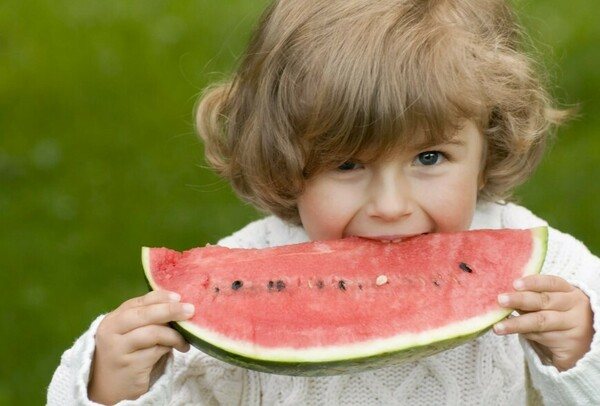
The indicated beneficial properties are valid for watermelons grown in environmentally friendly areas without the use of chemicals and growth accelerators.
Important!
Eating berries with nitrates negatively affects the condition of the blood.
As a result, the risk of developing oxygen starvation increases, which is dangerous for a small organism.
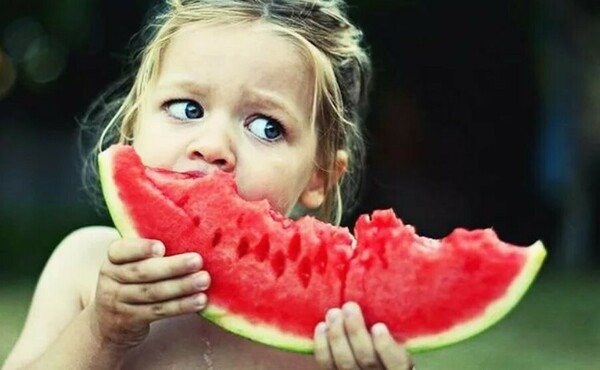
Diarrhea

There are several factors that cause diarrhea in a child after eating watermelon:
- Excessive amounts of nitrates. Unscrupulous agronomists use nitrogen fertilizers for rapid crop growth, which tend to accumulate in it. After eating such watermelon, the child begins to have diarrhea. This is how the body gets rid of toxic substances.
- The pulp may contain harmful microorganisms that enter it as a result of damage to the integrity of the rind or improper storage. It is a favorable environment for the proliferation of bacteria, which, when entering the baby’s intestines, cause the development of an inflammatory process, leading to diarrhea.
- Diarrhea may be a sign of food poisoning. In this case, there is an additional deterioration in overall health. In case of poisoning, spasmodic pain appears in the abdomen; in case of normal intestinal disorder, it is permanent.
It can be cut into small cubes and mixed with other fruits and berries that the baby is already familiar with. This will make a delicious vitamin salad. The pulp can also be made into juice.
The summer season pleases us with fresh fruits, berries and a variety of vegetables. It is especially pleasant to enjoy a juicy sweet watermelon in the summer heat, but is it possible to give it to small children? In order to safely introduce your child to this new product, it is worth learning more about its benefits, the optimal time for introducing it into the diet and the nuances of choosing complementary foods.
We recommend reading: Cough in an infant: how to treat it: what to do

When can it be introduced into the diet?
At what age can you give your child watermelon? Pediatricians recommend giving your baby the berry no earlier than 10-11 months. The main condition is that the watermelon is grown without the use of chemicals. Otherwise, you can try the striped fruit no earlier than 2 years. If introduced early into the diet, serious gastrointestinal upset and disorders of the urinary system can occur.
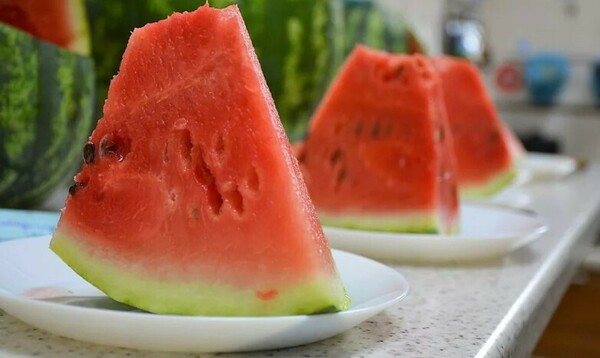
General tips and recommendations for eating watermelon
In order not to cause stress on the body, giving your baby juice or pieces of pulp, you can give watermelon in the form of a fruit salad, combining with it a finely chopped apple, pear, or banana. You should also adhere to the following rules:
We recommend reading: What does Tsindol help with: indications for use, instructions and analogues
At what age can a child start giving melon? - read here.
Section of proper nutrition for children. How to follow the diet and nutrition standards, read here https://jliza.ru/pitanie/.
By using the tips on buying and consuming watermelon, the risk of harming your baby’s health will be minimized. Take care of your child!
- Fruits of earlier importation often contain toxic substances that the child and his body are unable to digest.
- Watermelon is a strong diuretic, which can negatively affect a child’s kidneys: for a fragile body, this is a serious burden.
- Children can be given a serving of striped melon of 50 grams per year. The pulp must be completely free of seeds before serving. The berries are best served in a mushy state.
- For the first feeding, you can introduce the baby to the berry by wrapping the pulp in gauze and squeezing the juice out to the baby. At the age of 2 years, the portion of watermelon delicacy is increased to 100 grams. For the age of 3 years – up to 150 g.
- Before giving your child a piece of green berry, you need to try it yourself. If there is no reaction within two hours, feel free to offer the watermelon to your baby. If a child, having tried a berry, refuses to eat it further, you should not force it. It will be possible to produce striped berries next year.
- After taking watermelon, parents need to monitor the child’s condition throughout the day. These may not necessarily be allergic manifestations - individual intolerance to the berry is possible.
- Drinking watermelon juice should be reserved for children over two years of age. The juice contains the highest percentage of nitrate accumulation. And since the digestive system of a small child is vulnerable, this will ultimately lead to poisoning and tummy pain.
Norms and rules of introduction
The new product must be administered to infants with caution. At the same time, be sure to monitor the baby’s health.
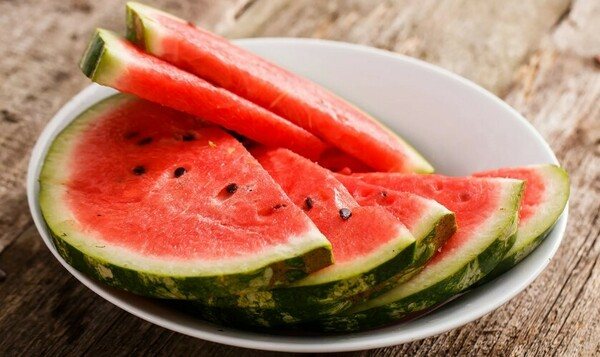
Correct action:
- Offer to try 1 tsp. pulp without seeds.
- The product must be given in the morning to assess the child’s behavior.
- Observe the child’s condition for two days.
- If swelling, itching, redness of the skin, watery eyes, or diarrhea occur, the product should not be given again.
- If there are no negative effects, after 2 days you can give 2 tsp. pulp, gradually increasing the dosage to normal.
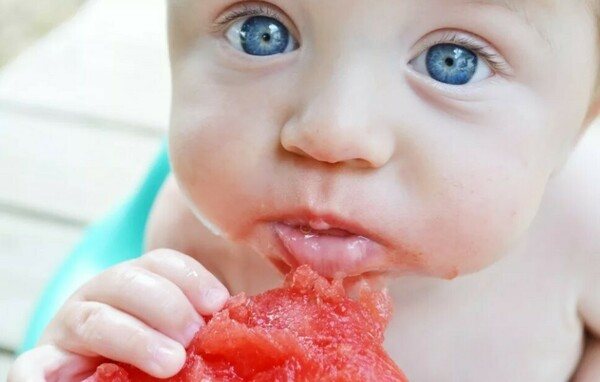
If after some time an allergy appears, gastrointestinal upset then it is necessary to remove the product from the diet for a while. After 20-30 days, try again. Despite the absence of contraindications, the fruit pulp should not be consumed in excessive quantities.
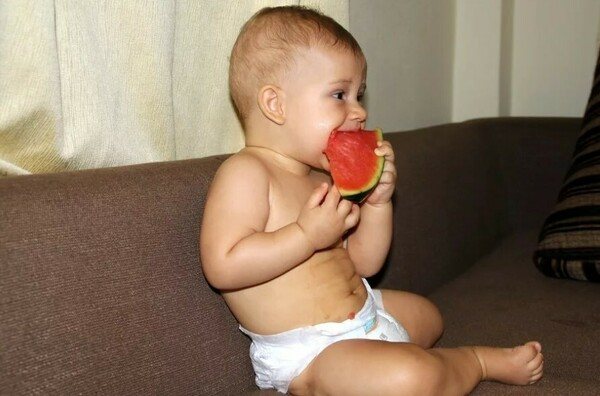
Let's consider the daily dosage of striped berries for children:
- from 10-11 months to 30 g;
- from 1 year to 2 years - 50 g;
- from 2 to 3 years - no more than 100 g;
- from 3 to 6 years - no more than 150 g.
Having found out at what age you can give your child watermelon, it is worth remembering that the child’s body is not able to fully resist the effects of nitrates, toxins, sometimes contained in watermelons. Therefore, you need to choose the berries carefully.
General recommendations
Watermelon is useful not only for children; everyone can eat it if there are no contraindications. But to ensure that this berry does not cause harm, it is worth following the recommendations of specialists. Doctors repeat this tirelessly every year, but for some reason we constantly forget about them.
- Do not buy berries before the end of August, since in the earlier period they contain large quantities of nitrates, which are used for rapid ripening.
- Watermelon is known for its ability to accumulate various harmful substances, so do not shop near the road.
- The best place to buy watermelons is the market, where all products undergo strict pre-sale inspection.
- Do not agree to cut the fruit and do not take cracked ones, as microbes immediately penetrate inside.
- Before eating, wash the watermelon well, preferably with soap.
- Do not leave the fruit in the sun, as the rotting process begins quite quickly.
- Also, you shouldn’t store it for a long time; the very next day, the watermelon will do more harm than good.
- Do not eat the fruit if you are not sure of its freshness, and especially do not give it to children.
Useful: Recipes for nursing mothers based on using a multicooker
By following these simple rules for purchasing and eating watermelon, you do not risk your health at all. Bon appetit!
Useful qualities
If we consider melon as a food product, then it is extremely useful for a baby from a certain age, as it has a beneficial effect on many processes in the baby’s body:
In addition, it contains nicotinic acid, which promotes the metabolism of substances such as fats, proteins, and carbohydrates. By the way, the pectin found in it is indispensable in removing various toxins. Melon also perfectly quenches thirst and hunger, because it contains a lot of water and light sugars.
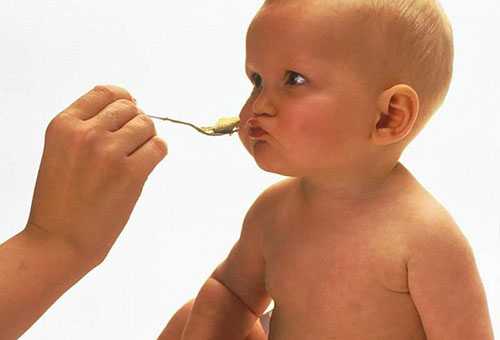
How to choose the right watermelon?
If you have a baby in your family, then you should be especially responsible when choosing watermelons.
Here are some recommendations:
- The best watermelons come from your own garden. You probably know what they were fed, and whether it will harm your children.
- If there is no garden bed, then it is better to buy during the melon season: from mid-August to the end of September. Self-ripened watermelons contain less chemicals.
- Do not buy watermelons at spontaneous markets near railways and highways.
- Do not cut the purchased watermelon until you wash it well. In this way you will protect yourself and your family from many bacteria.
- If a watermelon is picked after ripening, it will definitely have a slightly yellowish side. A white spot indicates that the watermelon has been well fed with nitrates.
- Choose a watermelon by sound. When squeezed, a ripe watermelon crunches, and when tapped with a finger, it makes a peculiar sound, as if there is emptiness inside.
- To test watermelon for nitrates at home, place a small piece of the pulp in cold water and shake. If the water has become cloudy, then watermelon can be given to children. If the water remains clear or turns pink, the nitrate content standards have been exceeded. Children should not eat this watermelon. And it’s better to abstain yourself.
Why not for babies?
It must be said that, in addition to its benefits, melon can cause harm, especially for those children who have not yet reached 12 months of age. This juicy delicacy is not without its drawbacks.
- Poor digestion by the gastrointestinal tract in large quantities. That is why pediatricians do not recommend giving it to children under one year old.
- one year old;
- if he has diarrhea;
- if he has problems with the stomach or intestines;
- if he has diabetes.
If the baby has crossed the life line of 12 months, then he can be offered to try a small piece, but only cut off from the fruit that grew on his own plot. The famous pediatrician Evgeny Komarovsky still recommends giving this product only when the baby turns 2 years old.
So, we can summarize everything and say unequivocally that melon is not allowed for a baby:
It can be recommended by a doctor to a child under one year old if the baby has kidney problems.
